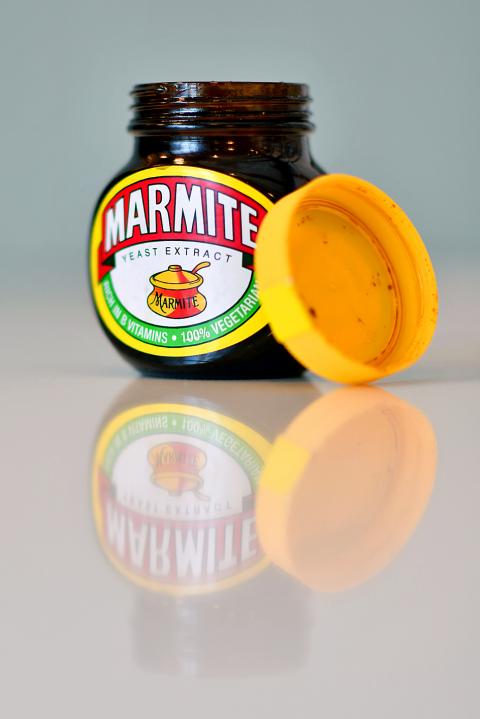Britain’s biggest retailer Tesco PLC has pulled dozens of Unilever PLC brands from its Web site in a row over pricing sparked by the Brexit-induced plunge in the pound, one of the most vivid signs to date of how the referendum could hurt consumers.
The dispute between two of Europe’s best-known companies means popular products such as Marmite and PG Tips tea bags will no longer be available via Tesco’s Web site, the country’s biggest online retailer.
The row shows how Britain’s decision to quit the EU has exacerbated tensions between suppliers and retailers, with both sides battling for profits as the fall in the pound hits margins on imported goods.

Photo: AFP
Unilever has been trying to raise the prices it charges Britain’s big four supermarkets — Tesco, Sainsbury’s PLC, Asda Stores Ltd and Morrisons Supermarkets PLC — across a wide range of goods by about 10 percent, saying it needs to offset the higher cost of imported commodities, two people with knowledge of the situation told reporters.
One person with knowledge of the situation at a big-four grocer said they had protested against Unilever’s demands, adding that some of the products they wanted to charge more for are actually made in Britain.
“What’s really a problem is when a supplier like Unilever comes and asks for across the board cost increases and there’s no negotiation, there’s no discussion. That’s been the approach that’s upset the grocers,” he said.
Speaking as the firm reported results, Unilever chief financial officer Graeme Pitkethly said price increases taken to offset rising costs are a normal part of doing business, but he declined to comment specifically on the row with Tesco.
As of Wednesday evening, Unilever products — including Marmite, Ben & Jerry’s ice cream, Lynx body spray and PG tips tea — were unavailable on Tesco’s Web site, but the shortage had not yet affected stores, a Tesco spokesman said.
“We are currently experiencing availability issues on a number of Unilever products. We always work to ensure customers get the best possible prices and we hope to have this issue resolved soon,” he said.
A spokesman for Unilever declined to comment.
Last week, Tesco chief executive Dave Lewis, a former senior Unilever executive, hailed a transformed relationship with suppliers as a major factor in the grocer reporting a 60 percent rise in first-half profit and the setting of tougher profitability targets.
However, he indicated it was not a given that suppliers should be able to recoup the cost of the falling pound as they had not always passed on benefits when sterling was much stronger.
Since Britain’s shock Brexit decision in June its currency has plunged almost 18 percent against the US dollar.
Most analysts and economists believe that the pound’s slump could lead to higher grocery prices, following years of deflation due to a price war between the big chains.

The Eurovision Song Contest has seen a surge in punter interest at the bookmakers, becoming a major betting event, experts said ahead of last night’s giant glamfest in Basel. “Eurovision has quietly become one of the biggest betting events of the year,” said Tomi Huttunen, senior manager of the Online Computer Finland (OCS) betting and casino platform. Betting sites have long been used to gauge which way voters might be leaning ahead of the world’s biggest televised live music event. However, bookmakers highlight a huge increase in engagement in recent years — and this year in particular. “We’ve already passed 2023’s total activity and

Nvidia Corp CEO Jensen Huang (黃仁勳) today announced that his company has selected "Beitou Shilin" in Taipei for its new Taiwan office, called Nvidia Constellation, putting an end to months of speculation. Industry sources have said that the tech giant has been eyeing the Beitou Shilin Science Park as the site of its new overseas headquarters, and speculated that the new headquarters would be built on two plots of land designated as "T17" and "T18," which span 3.89 hectares in the park. "I think it's time for us to reveal one of the largest products we've ever built," Huang said near the

China yesterday announced anti-dumping duties as high as 74.9 percent on imports of polyoxymethylene (POM) copolymers, a type of engineering plastic, from Taiwan, the US, the EU and Japan. The Chinese Ministry of Commerce’s findings conclude a probe launched in May last year, shortly after the US sharply increased tariffs on Chinese electric vehicles, computer chips and other imports. POM copolymers can partially replace metals such as copper and zinc, and have various applications, including in auto parts, electronics and medical equipment, the Chinese ministry has said. In January, it said initial investigations had determined that dumping was taking place, and implemented preliminary

Intel Corp yesterday reinforced its determination to strengthen its partnerships with Taiwan’s ecosystem partners including original-electronic-manufacturing (OEM) companies such as Hon Hai Precision Industry Co (鴻海精密) and chipmaker United Microelectronics Corp (UMC, 聯電). “Tonight marks a new beginning. We renew our new partnership with Taiwan ecosystem,” Intel new chief executive officer Tan Lip-bu (陳立武) said at a dinner with representatives from the company’s local partners, celebrating the 40th anniversary of the US chip giant’s presence in Taiwan. Tan took the reins at Intel six weeks ago aiming to reform the chipmaker and revive its past glory. This is the first time Tan